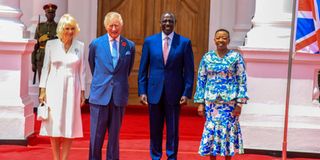Foreign policy needs public consensus

President William Ruto, Britain's King Charles III, First lady Rachel Ruto and Queen Camilla at State House on October 31.
Matters of foreign policy in Kenya have always felt distant, complicated, incomprehensible and even irrelevant to the mwananchi. Most Kenyans are unaware of the existence, or even definition, of it.
Foreign policy is a collection of strategies, positions, aspirations and plans for interacting with the global order. It’s like a handbook of policies on how best a country should relate with others for individual and mutual benefit and co-existence.
Kenya’s foreign policy has been in the shadows for far too long. Although there is now a written public document, the sentiment of detachment is palpable. It is almost a matter of tacit understanding that matters of foreign policy, foreign relations and international affairs are the preserve of a few. That, unfortunately, (in)advertently creates, entrenches and sustains a system of privilege, elitism and unchecked Executive power, due to the grey area.
Every Kenyan has a constitutional right to information and participation in their own governance. Foreign policy forms part of this and the Constitution upholds such involvement. We all should know the status of our relations with other states; the rationale behind the government position on international affairs; and how it is formulated.
The assumption, and rightly so, is that the government acts, by delegated power, to represent and echo the interests and wishes of the people. The opposition and mixed feelings and a lack of clarity on issues such as Western Sahara, Haiti and Israel-Palestine are indicators that government positions may not be representative of a consensus.
A credible foreign policy should reflect the general mood, hopes, aspirations, sentiments, concerns and principles of the country. It is transparent, inclusive, clear honest and consistent.
How do we get here? First, foreign policy-making must be outlined clearly and publicly. Secondly, public participation, especially on sensitive issues that could affect the country’s reputation, must take place. Issues such as those of borders, self-determination, external intervention and foreign investments have real consequences of privatisation.
Thirdly, the process and document must espouse the national values outlined in Art. 10 of the Constitution—patriotism, participation of the people, transparency, accountability and inclusivity.
Ethiopia, in the 2000s, embarked on drafting and making public a national strategy and policy targeting Ethiopians. This can be a good tool for transparency and dissemination of information and can act as the sketchpad for public participation. Besides, the Horn of Africa Monthly Review informs Ethiopians and lets them assess and analyse the country’s positions, interests and relations.
Foreign policy is fundamental to our existence; more attention should be paid to it. It is not only our window to the outside world but also, importantly, the foundation for national development.
Ms Sambu is an international relations and conflict resolution expert. [email protected]. @s_chepkorir





